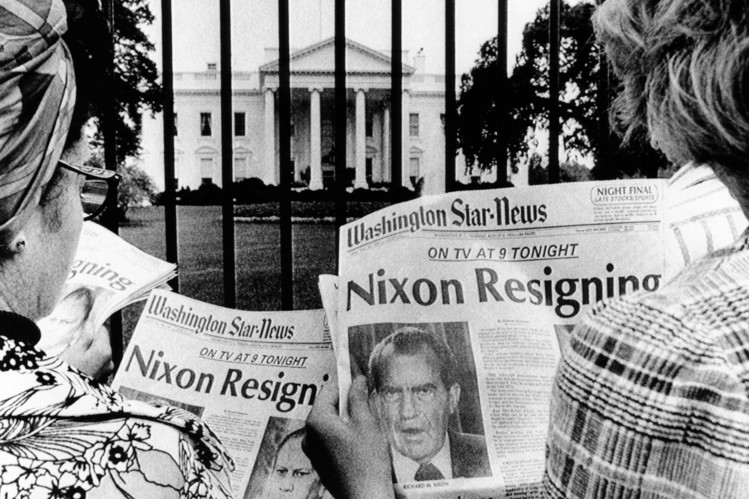Winner of the Fall 2019 StMU History Media Award for
Best Article in the Category of “Political History”
“People have got to know whether or not their President is a crook. Well, I’m not a crook. I’ve earned everything I’ve got.”1 President Richard Nixon at a November 17, 1973 news conference. The state of American politics was at an all time low during Nixon’s second term. He was in a war against his own words and actions everyday, leading up to him resigning from his presidency. On October 20, 1973, the day that has subsequently become known as the “Saturday Night Massacre,” momentum towards the impeachment of Nixon grew rapidly. The Saturday Night Massacre was when President Richard Nixon fired Special Prosecutor Archibald Cox as well as accepting the resignations of Attorney General Elliot Richardson and Deputy Attorney General William Ruckelshaus. Peter Rodino had been Chairman for the House Judiciary Committee for only a few months when his committee began to hear the case for Nixon’s impeachment. On October 23, 1973, resolutions calling for impeachment, impeachment investigations, and appointment of a special prosecutor were introduced against Nixon.2
Peter Rodino went from being a little man, both in reputation and in stature, to being the big boss by working sixteen to eighteen hour work days as soon as the congressional recess ended on January 21, 1974. During this time, Rodino went through extreme mental and physical changes. Due to his time being consumed by the amount of work he was indulging in, he had gained some weight. So in order to lose it, he would skip lunch throughout the week and existed instead on black coffee.3 The committee, as a whole, was not able to function properly, due to their inability to properly retrieve evidence to use against Nixon and figure out how to properly protect it. In February of 1974, Rodino believed he picked up a virus from Florida, leading him to have shortness of breath, become light headed, have chest pains intensify and became tired quicker. He checked up with a doctor after a break on the House floor after becoming alarmed of the symptoms he was experiencing. The doctor sent him to Bethesda Naval Hospital where he was given an electrocardiogram examination and other checks to determine if he had suffered from a heart attack, which he hadn’t, but his doctor did tell him to rest.4

After the Saturday Night Massacre, Rodino began his committee’s investigation. It was not until October 30, 1973, that the House Judiciary Committee began to consider the impeachment process against Nixon. In early January 1974, speculation arose that Nixon was going to resign from the presidency. On February 6, 1974, the process for impeaching Nixon was formally initiated, with the House of Representatives passing a resolution. The resolution gave the Judiciary Committee the authority to investigate whether there was sufficient grounds to impeach Nixon of high crimes and misdemeanors in relation to the Watergate break-in and subsequent cover-up. On April 11, 1974, the Judiciary Committee subpoenaed 42 White House tapes of key conversations. A week later, Leon Jaworski (the Special Prosecutor for the Watergate Case) sent subpoenas for 64 additional recordings.5 Although Nixon wanted to refuse, he eventually ordered transcripts of the tapes to be edited, or removed, so he could send that to Jaworski. The transcripts became public on April 30; however, the tapes and other documents were still withheld from Jaworski. The Judiciary Committee rejected Nixon’s transcripts stating that they did not comply with the terms of the subpoena.6 The Democratic half of the proposed ad hoc committee met behind closed doors, so that after the general staff meeting, Jerry Zeifman (Chief Counsel of the House Judiciary Committee), Larry O’Brien (Chair of Democratic National Committee), and Rodino went to Rodino’s office to draft the statement he expected to issue after the Democrats met. When the three got there, an aide told them the committee had received four hundred telegrams responding to Nixon’s tape offer. They all said to impeach him anyhow.7

Peter Rodino spoke to the House in February 1974 saying, “Whatever the result, whatever we learn or conclude, let us now proceed with such care and decency and thoroughness and honor that the vast majority of American people, and their children after them, will say: ‘That was the right course. There was no other way.'”8 On July 27, 1974, the Judiciary Committee approved the first article of impeachment against Nixon. Two more articles were approved on July 29 and 30. The Articles of Impeachment were over Nixon’s obstruction of justice, abuse of power, and contempt of Congress. Peter Rodino gave a speech during the 1974 voting of Articles for Impeachment saying, “We have deliberated. We have been patient. We have been fair. Now the American people, the House of Representatives and the Constitution and the whole history of our republic demand that we make up our minds.”9
During the House of Judiciary Committee impeachment hearings, the primary focus was Article One of the United States Constitution. The power to impeach was vested directly in the House of Representatives by the second section of the first article of the Constitution. To grant court intervention would be to strike at the very heart of the concept of three co-equal branches of government.10 “Article I, section 3, clause 7 of the Constitution provides that a person removed from office by impeachment and conviction ‘shall nevertheless be liable to Indictment, Trial, Judgment and Punishment, according to the Law.’ But there are no guidelines in the Constitution about a President who has resigned.” Article I charged Nixon with Obstruction of Justice that had a vote of 27 to 11. Article II charged Nixon with Abuse of Power that had a vote of 28-10. And lastly, Article III charged Nixon with Contempt of Congress with a vote of 21-15.11 The other two articles that were being considered, were rejected. They charged Nixon with Ordering the Falsification of records (concerning the secret bombing of Cambodia), 12-26, and Personal Finances and Failure to Pay Taxes, losing by the same margin. Evidence of the tapes surfaced on August 5, when Nixon complied with the U.S. Supreme Court’s ruling requiring him to provide transcripts of the missing tapes. The evidence that the tapes showed was that clearly he implicated himself in a cover-up of the Watergate break-in. August 7, 1974, Senators Goldwater and Scott, and Representative Rhodes met with Nixon in the Oval Office. They spoke to him about his support diminishing in Congress. Goldwater later wrote, “[Nixon] knew beyond any doubt that one way or another his presidency was finished.”12

The president resigned ten days after the Judiciary Committee voted on the three articles, before the full House voted on whether to approve the articles for a Senate trial. On August 8, 1974, Nixon announced that he was resigning from the presidency, labeling himself as the first president in U.S. history to voluntarily resign from office. On August 22, a 528-page report appeared laying out details of what it called the “clear and convincing evidence” against Nixon. Criminal prosecution was a possibility on both the federal and state level against Nixon. However, on September 8, 1974, President Gerald Ford issued a full and unconditional pardon of Nixon. This pardon immunized him from prosecution for any crimes he had “committed or may have committed or taken part in” as president.13 Nixon’s official response to the pardon (September 1974): “Looking back on what is still in my mind a complex and confusing maze of events, decisions, pressures, and personalities, one thing I can see clearly now is that I was wrong in not acting more decisively and more forthrightly in dealing with Watergate, particularly when it reached the stage of judicial proceedings and grew from a political scandal into a national tragedy. No words can describe the depths of my regret and pain at the anguish my mistakes over Watergate have caused the nation and the presidency, a nation I so deeply love and an institution I so greatly respect.”14 However, Nixon proclaimed his innocence until his death in 1994.
- Carroll Kilpatrick, “Nixon Tells Editors, ‘I’m Not A Crook’,” November 18, 1973, The Washington Post, https://www.washingtonpost.com/politics/nixon-tells-editors-im-not-a-crook/2012/06/04/gJQA1RK6IV_story.html. ↵
- Howard Fields, High crimes and Misdemeanor: Was Nixon Guilty? How the Rodino Committee Reached Its Conclusion (New York: Norton, 1978), 6. ↵
- Howard Fields, High crimes and Misdemeanor: Was Nixon Guilty? How the Rodino Committee Reached Its Conclusion (New York: Norton, 1978), 5, 103. ↵
- Howard Fields, High crimes and Misdemeanor: Was Nixon Guilty? How the Rodino Committee Reached Its Conclusion (New York: Norton, 1978), 5, 104. ↵
- Howard Fields, High crimes and Misdemeanor: Was Nixon Guilty? How the Rodino Committee Reached Its Conclusion (New York: Norton, 1978), 193. ↵
- Stanley I. Kutler, The Wars of Watergate: The Last Crisis of Richard Nixon (New York: Knopf, 1990), 323. ↵
- Howard Fields, High crimes and Misdemeanor: Was Nixon Guilty? How the Rodino Committee Reached Its Conclusion (New York: Norton, 1978), 52-53. ↵
- The Washington Post, “Peter Rodino Jr., 95; Led Nixon Impeachment Hearings in ’74,” Los Angeles Times, May 8, 2005, https://www.latimes.com/archives/la-xpm-2005-may-08-me-rodino8-story.html. ↵
- Peter Rodino, “Watergate Figure Peter Rodino Dies” (speech, Washington, DC, July 1974. NPR. https://www.npr.org/templates/story/story.php?storyId=4645365. ↵
- Howard Fields, High crimes and Misdemeanor: Was Nixon Guilty? How the Rodino Committee Reached Its Conclusion (New York: Norton, 1978), 5, 105. ↵
- “Articles of Impeachment,” 1995-2019, Watergate.info,https://watergate.info/impeachment/articles-of-impeachment. ↵
- Bonnie K. Goodman, “OTD in History… July 27, 29 & 30, 1974, the House introduces articles of impeachment against President Richard Nixon,” July 27, 2018, Medium, https://medium.com/@BonnieKGoodman/otd-in-history-july-27-29-30-1974-the-house-introduces-articles-of-impeachment-against-8d638cb266c0. ↵
- Stanley I. Kutler, The Wars of Watergate: The Last Crisis of Richard Nixon (New York: Knopf, 1990), 555. ↵
- “The Statement by Nixon,” September 9, 1974, The New York Times, https://www.nytimes.com/1974/09/09/archives/the-statement-by-nixon-pr.html. ↵



51 comments
Saira Locke
I feel as though this article about Nixon’s impeachment is very relevant at this time due to the investigation on Trumps impeachment today. I don’t know much about Nixon because I have never been interested in history or politics, but this article was very informative in Nixon’s life if you have little knowledge prior to reading. It was very interesting to read up on all of the details on Nixon’s impeachment as it has given me more info on the whole process.
Hannah Hennon
We always learn about President Nixon and the possible impeachment, but I never learned about the days leading up to Nixon’s resignation and the impeachment process. I think Nixon was in charge of the Watergate break-in and cover-up. In my opinion, he should have owned up and resigned. I also do not think President Ford should have not pardoned Nixon
Edith Santos Sevilla
I like the perspective that this article took, it is different in the sense that we always learn about the actual scandal, but not really about the problems that occurred internally in the U.S. Government. Now with what’s happening with our president it is interesting that we are living history it is interesting to see how it has happened in the past and how it might happened again. Overall the article is interesting and focuses on the important aspects of the impeachment.
Cynthia Perez
Nixon really shouldn’t have resigned. He should’ve owned up to what he had done rather than sit back and bathe in his own lies. Maybe things would’ve turned out differently had he not tried to cover up the Watergate Scandal, if there was more evidence and research into it who knows what the motives or purpose behind it was. Besides of course trying to get Nixon re-elected, considering how it worked against him in the end.
Emmanuel Ewuzie
The Watergate Scandal is infamous in my eyes. Despite not living in that era, I’ve known of the scandal since I was a child because my father used to always to put NPR on the radio on our drives home from playing tennis. My father used to laugh and berate the former president for his criminal actions. His actions were criminal and just plain wrong but he was pardoned by the next president so that’s that in my eyes. There’s no reason to get upset over it.
Kathryn Martinez
I remember learning about the Watergate scandal and the article did a great job giving out information. This was a great way to review the government procedure regarding the impeachment process. Many people have heard about Nixon but most don’t understand the events and steps that had led up to the possible impeachment of Nixon. It’s a very interesting article to have read especially looking at the United State’s current president and the overall want of impeachment of him.
Vania Gonzalez
This scandal is written down in our history and taught in every U.S. History class, what Nixon did was something this nation had not seen yet and it surprised many people to have someone they trusted to lead the country betray it in the way he did. His impeachment process did not take long it was more of deciding if they wanted to begin the process that was taking long, I see Nixon as a coward because he resigned from office before he was embarrassed with being impeached from office. He could not face what he did so he left the situation before it ruined his image although it was ruined long before he began the impeachment process. Very good article.
Kimberly Parker
If I’m being honest, I’ve never heard about the Watergate scandal. But when I read the title of this article, I was intrigued because I knew that Nixon was one of the US presidents, and I had never known that Nixon had been impeached. The process of it all was very interesting, and this article did a good job of stating facts and being informational about the whole ordeal.
Sebastian Azcui
I learned about this back in High School. I found it really interesting and I got curious about it. The Watergate Scandal was something big in American history and something remarkable. I know more about the scandal and what happened afterwards which led to the impeachment of Nixon. But I never learned about the government processes that this went through and how this was proceeded. Nixon had no other option than to leave.
Kelsey Sanchez
I heard about the impeachment of Nixon and how it was such a decision that can either affect or impact. It was a surprise to see how he would edit his tapes and send them so they can be heard. This article was interesting to read due to explaining and detailing the articles that have been needed in order of making the decision of the impeachment.